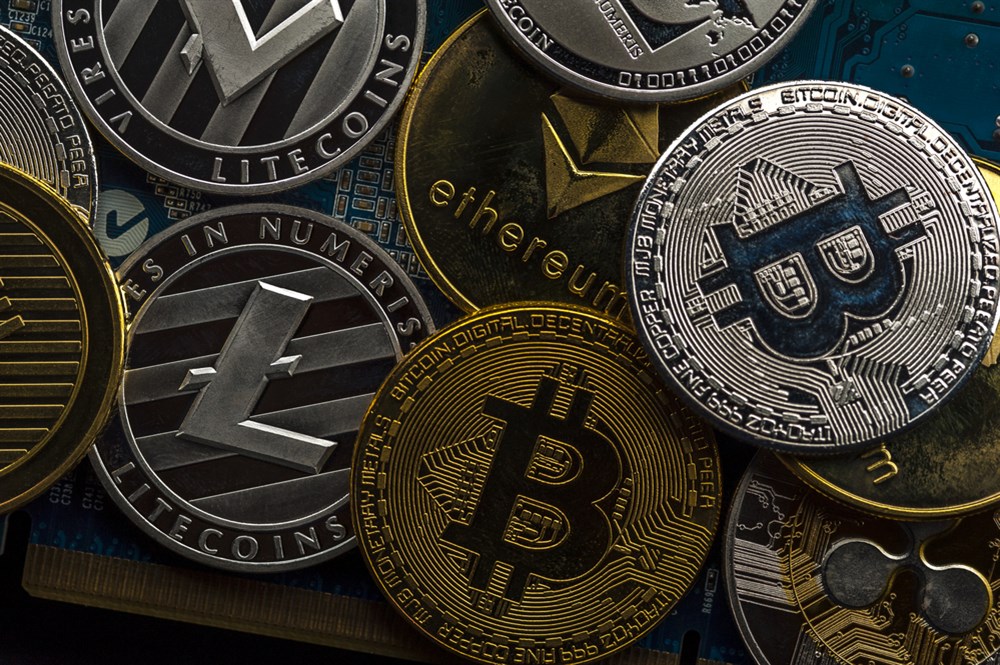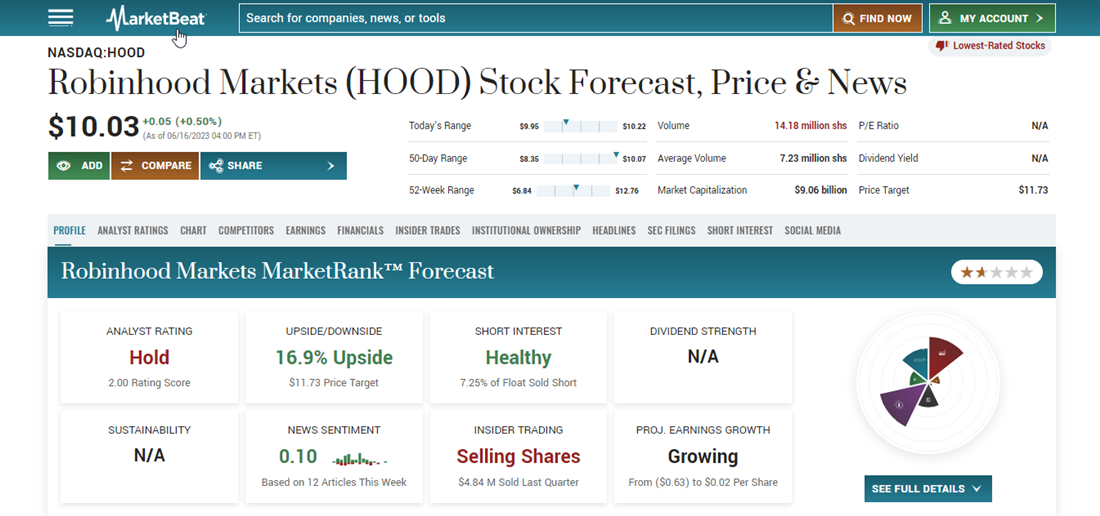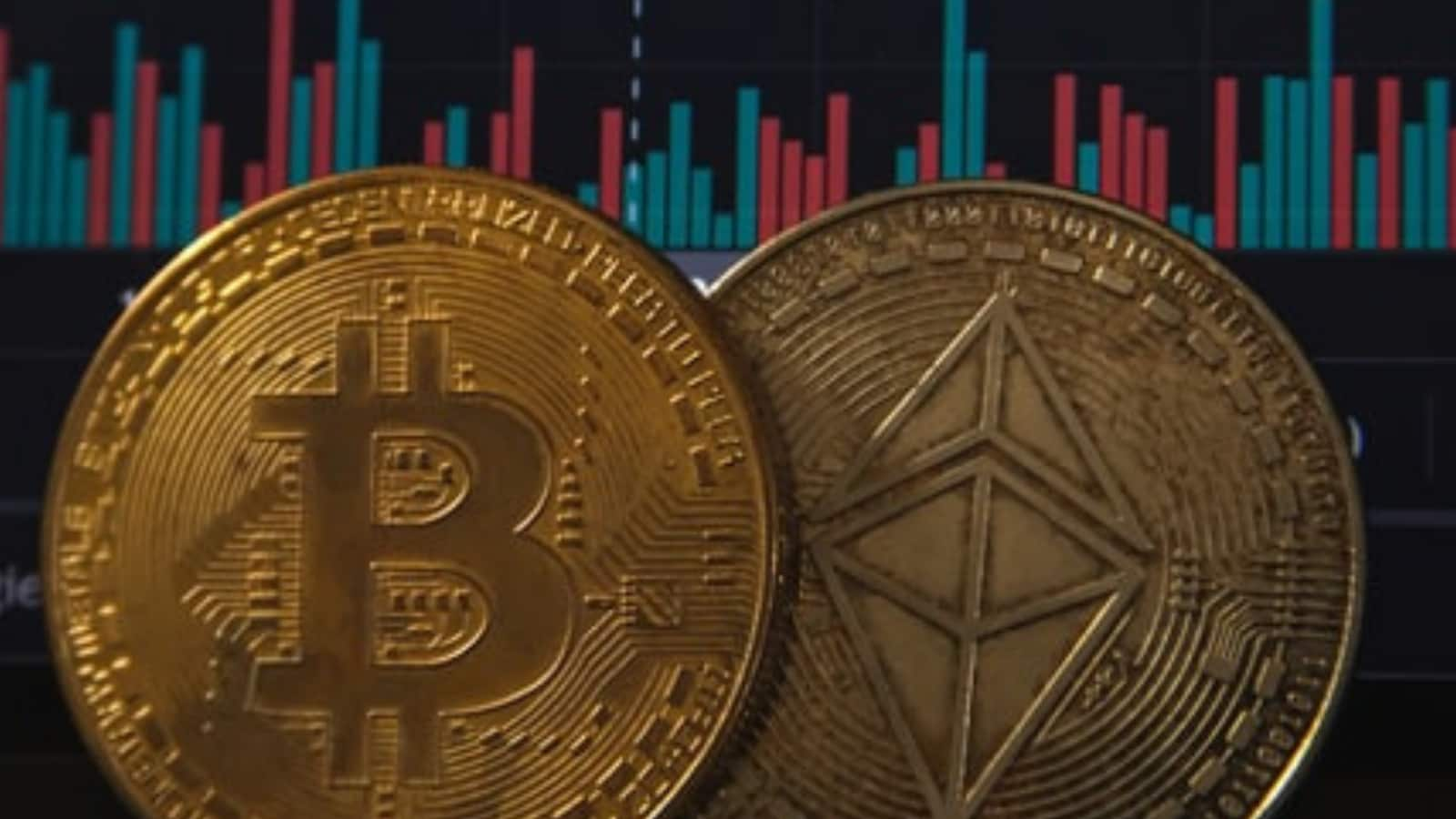Crypto
How to Invest in Cryptocurrency for Beginners

Key Points
- Cryptocurrencies are digital assets bought and sold through peer-to-peer networks and exchanges.
- The blockchain is a digital ledger that keeps track of various transactions performed on each cryptocurrency network.
- Cryptocurrencies have limited practical use and are highly volatile, but risk-seeking investors might find appeal in these assets.
- 5 stocks we like better than Coinbase Global
Interested in learning the best way to invest in crypto for beginners? Crypto’s reputation has suffered from countless scandals since the market receded from all-time highs in the fall of 2021. But despite the negative headlines and questionable regulatory status, crypto market caps remain substantial and interest from individuals and institutions continues to bubble under the surface.
There’s no better time to learn about how to invest in cryptocurrency for beginners. We’ll explain how to get started in crypto, the risks involved in trading and owning these assets and how to keep yourself safe from volatility and scams.
What is Cryptocurrency and How Does it Work?
How do you invest in crypto for beginners? Let’s start with the basics —most cryptocurrencies aren’t currencies. Instead, they’re assets on a digital ledger known as the blockchain, which can be bought and sold without a third-party facilitator like a bank or brokerage. Since transactions are made peer to peer, cryptocurrencies are called decentralized assets.
To understand the crypto marketplace, you need to grasp the basics of the blockchain. Think of the blockchain as pieces of a massive puzzle, each with unique characteristics that differentiate individual blocks. Transaction data is imprinted into these blocks and added to the chain, creating an irreversible ledger. Network participants must use their computational power to solve math problems to confirm these transactions. The first entrant to correctly confirm the new block receives cryptocurrency tokens. By rewarding these “miners” with tokens, the blockchain network incentivizes participants to act cooperatively.
Bitcoin was the first cryptocurrency (even though the idea of digital assets has been around for decades) and remains the largest by market cap. Other widely used cryptocurrencies include Ethereum, Solana, Uniswap and Dogecoin.
Why Consider Investing in Cryptocurrency?
In light of recent scandals like FTX, BlockFi, Three Arrows Capital and various scams and money-laundering operations, cryptocurrency doesn’t have a sterling reputation. If you’re a risk-averse investor, it may be in your best interest to avoid cryptocurrencies, which are likely to remain volatile amidst high rates and a murky regulatory environment.
But cryptocurrency continues to interest individual and institutional investors, who see massive amounts of capital entering the space and want to get in on the action. Plus, the potential gains and lack of correlation to traditional assets like stocks, bonds and commodities make cryptocurrency an intriguing opportunity for those willing to take on the risk.
Understanding Different Types of Cryptocurrencies
If you want to learn how to invest in cryptocurrency, you’ll need to understand the market as a whole. The cryptocurrency ecosystem has tens of thousands of different assets, ranging from tokens like Bitcoin and Ethereum with market caps rivaling large-cap public companies to microcap altcoins with shakier foundations than most penny stocks. Cryptocurrencies don’t all follow the same protocol either: Bitcoin and Ethereum have two different authentication methods.
Bitcoin (Proof of Work)
The original digital currency is Bitcoin, developed in 2009 by the anonymous Satoshi Nakamoto, who may be an individual or a group. Bitcoin is notable because it’s the first digital asset to solve the “double-spending” problem. Most computer programs are infinitely copyable. Companies like Microsoft Corp. NASDAQ: MSFT lock their programs with a keycode to prevent copying.
Bitcoin uses the blockchain to create an unalterable ledger, which shows exactly how many Bitcoins have been spent in each transaction. Bitcoin miners must verify these transactions using increasingly more computational power. The confirmation process is known as a consensus algorithm, and Bitcoin uses this “proof of work” system to confirm transactions.
Ethereum (Proof of Stake)
Bitcoin’s main competition is Ethereum, which operates an entire virtual platform where participants can create applications known as Dapps. Ethereum is more like digital oil if Bitcoin is considered digital gold — a valuable commodity that can run different processes and protocols.
The actual token is ETH, used in peer-to-peer transactions. Ethereum uses a “proof of stake” consensus mechanism where transactions become verified by validators who hold significant amounts of ETH on the network. Proof of stake proponents claim it reduces the energy required to process transactions while retaining the decentralized nature of the network.
Decentralized Finance (DeFi)
DeFi is a vast ecosystem of market participants who buy, sell, lend and borrow with each other directly over cryptocurrency networks. For example, if you wanted to take out a traditional loan, you’d request money from the bank, which would lend it to you at a specific rate based on your credit history.
DeFi makes these loans on a peer-to-peer basis using networks like Uniswap, Chainlink or Polkadot. DeFi eliminates the need for central banks and institutions, which should cut transaction costs. Still, this area is completely unregulated and not recommended for crypto investing for beginners.
Stablecoins
One of the more plausible cryptocurrency uses cases is the stablecoin, an asset that seeks to maintain a peg to a traditional currency like the U.S. dollar. For example, the collateralized stablecoin seeks to maintain its $1 peg by buying or selling its reserve assets. Another form is the algorithmic stablecoin, which uses a formula to produce or eliminate tokens. Algorithmic stablecoins do not have collateralized backing and have suffered speculator blowups.
Non Fungible Tokens (NFTs)
Non fungible tokens (NFTs) became a popular way to invest in crypto for beginners in 2021 when projects like NBA TopShot, CryptoKitties and the Bored Ape Yacht Club rose to prominence. An NFT is a unique code (like a link) pointing to a digital asset, like an NBA dunk highlight or cartoon picture. This link is the thing traders buy and sell, not the actual digital asset itself. NFTs are highly speculative projects, and you should approach them cautiously, especially if you’re a new investor.
Key Factors to Consider Before Investing in Cryptocurrency
How much to invest in cryptocurrency for beginners? Before putting any capital onto a crypto exchange, you’ll need to consider the following questions:
- What type of crypto investment are you making? Are you just adding a small position of Bitcoin or Ethereum to your overall portfolio, or are you trying to strike it rich with smaller altcoins or NFTs?
- What is your time horizon? Are you holding cryptocurrency for years or decades or simply trying to quickly catch the next wave of volatility and sell for profit?
- What is your risk tolerance? Are you prepared to potentially lose your entire investment? Many investors believed their money was safe on the FTX exchange; now, that cash is gone and unrecoverable. Always keep crypto investments small in proportion to your other position.
Managing Risk in Cryptocurrency Investment
Managing risk is always the first step in a cryptocurrency investment plan. Here are a few pointers for crypto newbies:
- Keep position sizes small.
- Be able to handle volatility.
- Keep your tokens secure.
- Watch out for scams.
How to Keep Cryptocurrency Secure
The third point in the previous list is the most poignant, but how is it done? For example, if a beginner wants to learn how to invest in Bitcoin securely, they should start by researching various exchanges.
Who has the best safety protocols and track record? Many exchanges have sunk into insolvency without returning client funds, so always choose a reputable exchange. You can also keep your cryptocurrency holdings secure on a cold wallet — more on those below.
How to Buy Cryptocurrency
Want to learn how to buy cryptocurrency? Here’s your five-step plan:
Step 1: Select your cryptocurrency trading platform.
Selecting a safe cryptocurrency trading platform is the first crucial step to take, and in the wake of the FTX fiasco, you’ll want to learn as much as you can about each exchange or platform before making any deposits. The safest options are likely the large firms trading on public exchanges like Coinbase Global Inc. NASDAQ: COIN or Robinhood Markets Inc. NASDAQ: HOOD.
 If you want to trade digital tokens with small market caps and minimal volume, you might use offshore crypto exchanges or DeFi protocols, which carry more risk. When investing in cryptocurrency, you measure one type of risk or another every step of the way, even when selecting a trading platform.
If you want to trade digital tokens with small market caps and minimal volume, you might use offshore crypto exchanges or DeFi protocols, which carry more risk. When investing in cryptocurrency, you measure one type of risk or another every step of the way, even when selecting a trading platform.
Step 2: Set up your cryptocurrency wallet.
Transferring crypto investments into a digital wallet is one way to keep them safe. Investors have two options here: hot wallets and cold wallets. A hot wallet is an app or online platform protected by a personal passcode called a key. Hot wallets often come from exchanges (i.e., Coinbase Wallet), or you can download them from third-party sources.
Another option is the cold wallet, disconnected from exchanges and cryptocurrency networks. Much like a flash drive, cold wallets can be connected to computers for trading but also have storage limitations. Cold wallets are a safer but less convenient option for investors who want self-custody of their tokens.
Step 3: Develop a cryptocurrency investment plan.
You must develop a plan once you’ve set up your trading operation. Are you simply looking to add Bitcoin or Ethereum to your portfolio, or do you want a wide range of digital assets? How much capital are you willing to put in? And how long is your intended holding period? Thoroughly answer all these questions before investing in crypto.
Step 4: Research individual tokens and purchase assets.
After developing your plan, you’ll want to research the different digital assets available. Every new cryptocurrency token has a whitepaper and thesis behind it; you don’t need to read every single one, but at least have an idea of why each token was created and what it purports to do to improve the cryptocurrency marketplace.
Once you’ve completed your research and selected assets, purchase them and closely monitor your account. Remember, crypto trading is 24/7, and you’ll need to monitor assets closely when prices are this volatile. You can burn a well-laid plan in a matter of hours in cryptocurrency, so always err on safety.
Pros and Cons of Investing in Cryptocurrency
Here are some of the basic benefits and drawbacks of cryptocurrency investing:
Pros
The benefits may include:
- Disconnected from traditional financial markets: Cryptocurrency may offer true diversification away from stocks and bonds that often move in lockstep.
- Potential for massive returns: No reward without risk, and many of crypto’s earliest adopters have made unbelievable sums of money on their investments.
- Increasing availability for retail investors: With an ETF approaching and trading available on apps like Robinhood and Webull, cryptocurrency has never been more accessible to the public.
Cons
The downsides include:
- Extreme volatility: You think 20% down is a bear market? Many crypto tokens rise or fall 20% in a single day. If you can embrace volatility, cryptocurrency might not appeal to you.
- High transaction costs: Not only do crypto exchanges charge commissions, but the transaction costs on these assets can be high when the network is congested.
- Scams and rug pulls: Cryptocurrency has questionable regulatory status and remains a Wild West financial frontier. And like the old west, there are plenty of con men, scammers and fakes looking to pull the rug out from unsuspecting investors (the term rug pull was literally coined for these scams!).
Cryptocurrency: Do the Rewards Justify the Risks?
Cryptocurrency returns can be eye-popping, but are the risks justified? You must absorb extra risk to achieve above-average returns, but how much is too much? Cryptocurrency advocates claim the technology behind these assets has too much potential to ignore. A lack of regulation, proliferation of scams, and flat-out fraud are huge turnoffs for traditional investors. If you want to buy into cryptocurrency, understand the massive risks in the space and approach your investments appropriately.
FAQs
Can anyone invest in crypto? Now that digital assets have gained mainstream attention, here are a few frequently asked questions about how to get into crypto.
How much money do I need to start investing in crypto?
You don’t need a fortune when investing in cryptocurrency. Once you deposit into your crypto exchange account or digital wallet, you can buy as little or as much cryptocurrency as you want.
Can I start buying crypto with $100?
Yes, with $100, you can buy any listed cryptocurrency minus commissions and transaction fees. The only minimum is the deposit minimum set by individual exchanges and brokers.
How do I know what crypto to invest in?
You’ll need to research different cryptocurrencies and their mechanisms to buy the assets that fit your goals and risk profile. Larger coins like Bitcoin and Ethereum tend to be safer than smaller tokens, meme coins and NFT projects, but returns can vary based on the level of risk you’re willing to take.
Before you consider Coinbase Global, you’ll want to hear this.
MarketBeat keeps track of Wall Street’s top-rated and best performing research analysts and the stocks they recommend to their clients on a daily basis. MarketBeat has identified the five stocks that top analysts are quietly whispering to their clients to buy now before the broader market catches on… and Coinbase Global wasn’t on the list.
While Coinbase Global currently has a “Hold” rating among analysts, top-rated analysts believe these five stocks are better buys.
View The Five Stocks Here

Which stocks are likely to thrive in today’s challenging market? Click the link below and we’ll send you MarketBeat’s list of ten stocks that will drive in any economic environment.
Get This Free Report

Crypto
Warning Crypto Investors—This Malicious Code Could Empty Your Wallet

Bitcoin emblem over a graph.
Recent reports have uncovered a series of malicious extensions in the Visual Studio Code, or VSCode, marketplace, targeting software developers and cryptocurrency enthusiasts with sophisticated attacks designed to compromise their systems and steal sensitive data. VSCode is a popular code editor used by millions of developers worldwide.
Security researcher Amit Assaraf recently revealed how attackers are exploiting the VSCode marketplace. Assaraf uncovered extensions that appeared to offer valuable features but were, in fact, Trojan horses for malware. One extension, masquerading as an official Zoom integration, seemed legitimate, boasting numerous installs and positive reviews. However, upon installation, the extension downloaded a malicious script from a Russian server, executing unauthorized commands on victims’ machines.
The attackers had carefully crafted their extensions to look authentic. They used fake reviews, linked to reputable repositories, and inflated download counts to make the tools appear credible—practices that can lull even experienced developers into a false sense of security.
Crypto in the VSCode Crosshairs
Further investigations revealed that this malicious activity is part of a broader campaign targeting developers working in blockchain and cryptocurrency environments. Reporting from BleepingComputer noted that some of these extensions claimed to support Ethereum development or blockchain toolkits. They also provided the following list of ones that were submitted to the VSCode marketplace:
- EVM.Blockchain-Toolkit
- VoiceMod.VoiceMod
- ZoomVideoCommunications.Zoom
- ZoomINC.Zoom-Workplace
- Ethereum.SoliditySupport
- ZoomWorkspace.Zoom (three versions)
- ethereumorg.Solidity-Language-for-Ethereum
- VitalikButerin.Solidity-Ethereum (two versions)
- SolidityFoundation.Solidity-Ethereum
- EthereumFoundation.Solidity-Language-for-Ethereum (two versions)
- SOLIDITY.Solidity-Language
- GavinWood.SolidityLang (two versions)
- EthereumFoundation.Solidity-for-Ethereum-Language
Adding to these findings, researchers at ReversingLabs uncovered how the VSCode campaign overlaps with similar malicious activity in the npm package repository. An npm package is a piece of reusable code that can be easily shared, distributed and integrated into software projects. These packages are used to build applications faster by reusing common functionalities, rather than writing everything from scratch. In their report, ReversingLabs explained how attackers often use multiple platforms to spread their malware, creating a more extensive attack surface that targets developers across ecosystems.
The Vulnerabilities Of The VSCode Ecosystem
While VSCode is celebrated for its versatility and user-friendly extension system, these same features make it a prime target for attackers. The issues stem from several vulnerabilities within the extension ecosystem:
- Unverified Publishers: Most of the extensions in the VSCode marketplace come from unverified publishers. This leaves developers with little assurance about an extension’s authenticity.
- Trust in Metrics: Developers often rely on install counts and reviews to gauge an extension’s credibility. Attackers exploit this trust by inflating these metrics and posting fake reviews.
- Limited Oversight: Despite Microsoft’s efforts to monitor and remove malicious extensions, the sheer volume of offerings in the marketplace makes it challenging to detect threats promptly.
VSCode: A Secondary Threat
Cryptocurrency wallets, whether stored on a computer or secured with a hardware wallet, are critical tools for managing digital assets. While these wallets are designed to protect private keys and transactions, the surrounding software environment—such as VSCode—can introduce vulnerabilities that put funds at risk, especially for wallets stored on a computer. Recent discoveries of malicious VSCode extensions demonstrate how a compromised development environment can lead to significant crypto losses, even for those who believe their wallets are secure.
The VSCode Threat to Computer Wallets
For users storing cryptocurrency on a desktop wallet, the risks posed by malicious VSCode extensions are immediate and direct. Here’s how it can happen:
- Keystroke Logging: A malicious VSCode extension, installed unknowingly, can quietly monitor and log every keystroke. If a user types in their wallet password, private keys or recovery phrases, this sensitive information is captured and sent to the attacker. Even the most secure desktop wallet becomes vulnerable if its credentials are exposed.
- Clipboard Hijacking: During transactions, users often copy and paste wallet addresses to avoid manual errors. Malware embedded in a VSCode extension can intercept clipboard activity, replacing the intended wallet address with the attacker’s. Without double-checking the address, the user may unknowingly send funds directly to the hacker.
- Fake Prompts or Interfaces: Some malicious extensions inject phishing-style prompts into the software environment, asking users to “verify” their wallet credentials or seed phrases. These prompts appear legitimate, but the data entered is captured by the attacker.
- Manipulated Transactions: For developers working with blockchain APIs, malicious extensions can intercept and alter transaction details. For instance, if a wallet is used to send funds programmatically, an attacker could change the destination address or transaction parameters without the user noticing.
Imagine a blockchain developer using VSCode to build an app that integrates with their desktop wallet for testing purposes. They install an extension claiming to simplify Ethereum contract deployment. Unbeknownst to them, the extension is malicious. It begins logging keystrokes and steals the wallet password. When the developer initiates a test transaction, the extension intercepts the API call and replaces the intended recipient address with one controlled by the attacker. The funds are irretrievably sent to the wrong destination.
These revelations are a wake-up call for developers and platform administrators alike. The trust users place in extension marketplaces is being weaponized. Relying on trust metrics alone—such as download counts or reviews—is not sufficient. Developers must remain vigilant and take proactive measures to protect their environments and their cryptocurrency.
Crypto
Bitcoin Retreats From Record High After Fed Cools Risk Appetite

Bitcoin fell for the first time in four days with speculative bets being pared across financial markets after Federal Reserve officials suggested greater caution over how quickly they can continue reducing borrowing costs.
The original cryptocurrency fell as much as 5.3% to $100,752, a day after climbing above $108,000 for the first time in what’s been a record-breaking rally this year. The seven largest digital tokens as measured by market value were all lower, data compiled by Bloomberg show.
Crypto
Navigating the Rise of Cryptocurrency in Latin America

Cryptocurrency adoption in Latin America is
experiencing explosive growth, driven by a mix of factors in the area like
economic instability, financial innovation, and regulatory evolution. Countries
like Brazil, Argentina, and Mexico are emerging as global leaders in
cryptocurrency usage, offering a fertile ground for both individuals and
businesses to explore digital assets as practical solutions for real-world
financial challenges.
To learn more about Latin America’s rapidly
evolving crypto market, download our whitepaper, “Unlock the Potential of Latin
America’s Booming Crypto Market.”
Read the report on the Latam’s blooming cryptocurrency market.
The rising wave of crypto in Latin
America
Cryptocurrency adoption in Latin America is
accelerating, fueled by inflation and currency devaluation. In Argentina, where
inflation has devastated the peso, Bitcoin and stablecoins have played an
important role in protecting savings. Around 15% of the population uses crypto
regularly, finding it a critical hedge against inflation.
In Brazil, crypto is even being integrated
into mainstream finance. The country was one of the first to approve
cryptocurrency exchange-traded funds (ETFs), and by 2023, the value of USDT
transactions was equivalent to $55 billion, more than 80% of its crypto volume.
This makes Brazil a key player in the global crypto market.
Mexico has carved out a niche in crypto
remittances, with Bitso processing over $3.3 billion in cross-border payments
in 2022. Crypto is emerging as a more efficient solution for these
transactions, benefiting millions of families reliant on remittances.
Regulatory evolution driving market growth
The regulatory environment across Latin
America is evolving, creating opportunities for businesses to expand. For example,
El Salvador made history by becoming the first country to adopt Bitcoin as
legal tender, with further initiatives like Bitcoin-backed bonds and a
government-sponsored crypto wallet. This bold experiment has positioned El
Salvador as a global trailblazer for cryptocurrency adoption, even as its
long-term effects are being evaluated.
Meanwhile, Mexico’s fintech law from 2018
recognized cryptocurrencies as virtual assets, establishing a clear regulatory
pathway for businesses. This clarity has helped companies like Bitso thrive. Meanwhile,
Colombia’s regulatory sandbox has promoted crypto experimentation in a
controlled environment, attracting fintechs and positioning the country as a
future hub for innovation.
Argentina, while still working on a
comprehensive regulatory framework, has seen increased interest in crypto
regulation under its new pro-crypto government. Colombia’s sandbox model is
providing fintechs with a controlled environment to test their offerings,
positioning the country as an emerging leader in the digital asset space as
well.
Emerging opportunities
Despite infrastructure and regulatory
challenges, Latin America offers immense opportunities for crypto growth.
Argentina and Venezuela, with their hyperinflationary economies, continue to
see widespread crypto adoption as citizens seek alternatives to their unstable
currencies. Stablecoins like USDT and USDC can help individuals and businesses
in these countries by providing greater financial stability.
Mexico’s growing role in crypto remittances
and Colombia’s fintech-friendly environment highlight the region’s potential
for further expansion. Tokenization is another area of growth, with Brazil’s
agricultural commodity token project, Agrotoken, revolutionizing access to
credit for small farmers. Brazil’s Drex initiative also highlights the
country’s commitment to developing a fully digital economy and integrating
blockchain technology into mainstream financial systems.
Latin America’s complex economic landscape,
combined with its openness to crypto solutions, makes it an exciting market for
businesses seeking to leverage digital assets. By addressing regulatory and
payment infrastructure challenges, companies can unlock the full potential of
this rapidly evolving crypto market.
The role of payment solutions in this evolving
market
Cross-border payments and regulatory
complexities are significant hurdles for businesses expanding into the Latin
American crypto market. The region’s rising demand for remittances, along with
fragmented payment infrastructures, means businesses must navigate
multi-currency transactions. Additionally, evolving regulatory landscapes
require businesses to stay compliant while managing operational risks.
Paysafe addresses these challenges by
offering solutions that streamline cross-border payments, supporting multiple
currencies and reducing transaction costs. With strong integration into key
local systems, Paysafe helps businesses deliver the seamless payment options
customers expect.
Furthermore, Paysafe’s regulatory expertise
ensures businesses remain compliant across diverse markets, while its advanced
security features protect against fraud, providing businesses with the trust
and reliability they need to thrive in the region’s fast-growing crypto
ecosystem.
Conclusion
Latin America is a prime market for
cryptocurrency adoption and its growth shows no sign of slowing down. From the
pioneering efforts of El Salvador to the sophisticated regulatory framework in
Brazil, the region offers diverse use cases for businesses looking to enter or
expand their crypto operations. Our whitepaper highlights that despite
challenges like regulatory fragmentation and cultural nuances, Latin America
presents tremendous opportunities for growth.
For more detailed insights and strategies,
download our whitepaper, “Unlock the Potential of Latin America’s Booming
Crypto Market.”
Read the report on the Latam’s blooming cryptocurrency market.
By leveraging Paysafe’s comprehensive
payment solutions, businesses can seamlessly navigate the complexities of the Latin
American crypto landscape, unlocking the full potential of one of the world’s
fastest-growing markets.
Disclaimer:
This article is not intended to be
financial, investment or trading advice. This article is for information and
solely for education purposes. It does not protect against any financial loss,
risk or fraud.
Why Paysafe
Paysafe supports Latin American businesses
with over 25 years of experience, offering top-tier fraud, risk, and compliance
support. Their solutions streamline cross-border payments, support multiple
currencies, and reduce transaction costs, enabling confident expansion in the
crypto market.
Cryptocurrency adoption in Latin America is
experiencing explosive growth, driven by a mix of factors in the area like
economic instability, financial innovation, and regulatory evolution. Countries
like Brazil, Argentina, and Mexico are emerging as global leaders in
cryptocurrency usage, offering a fertile ground for both individuals and
businesses to explore digital assets as practical solutions for real-world
financial challenges.
To learn more about Latin America’s rapidly
evolving crypto market, download our whitepaper, “Unlock the Potential of Latin
America’s Booming Crypto Market.”
Read the report on the Latam’s blooming cryptocurrency market.
The rising wave of crypto in Latin
America
Cryptocurrency adoption in Latin America is
accelerating, fueled by inflation and currency devaluation. In Argentina, where
inflation has devastated the peso, Bitcoin and stablecoins have played an
important role in protecting savings. Around 15% of the population uses crypto
regularly, finding it a critical hedge against inflation.
In Brazil, crypto is even being integrated
into mainstream finance. The country was one of the first to approve
cryptocurrency exchange-traded funds (ETFs), and by 2023, the value of USDT
transactions was equivalent to $55 billion, more than 80% of its crypto volume.
This makes Brazil a key player in the global crypto market.
Mexico has carved out a niche in crypto
remittances, with Bitso processing over $3.3 billion in cross-border payments
in 2022. Crypto is emerging as a more efficient solution for these
transactions, benefiting millions of families reliant on remittances.
Regulatory evolution driving market growth
The regulatory environment across Latin
America is evolving, creating opportunities for businesses to expand. For example,
El Salvador made history by becoming the first country to adopt Bitcoin as
legal tender, with further initiatives like Bitcoin-backed bonds and a
government-sponsored crypto wallet. This bold experiment has positioned El
Salvador as a global trailblazer for cryptocurrency adoption, even as its
long-term effects are being evaluated.
Meanwhile, Mexico’s fintech law from 2018
recognized cryptocurrencies as virtual assets, establishing a clear regulatory
pathway for businesses. This clarity has helped companies like Bitso thrive. Meanwhile,
Colombia’s regulatory sandbox has promoted crypto experimentation in a
controlled environment, attracting fintechs and positioning the country as a
future hub for innovation.
Argentina, while still working on a
comprehensive regulatory framework, has seen increased interest in crypto
regulation under its new pro-crypto government. Colombia’s sandbox model is
providing fintechs with a controlled environment to test their offerings,
positioning the country as an emerging leader in the digital asset space as
well.
Emerging opportunities
Despite infrastructure and regulatory
challenges, Latin America offers immense opportunities for crypto growth.
Argentina and Venezuela, with their hyperinflationary economies, continue to
see widespread crypto adoption as citizens seek alternatives to their unstable
currencies. Stablecoins like USDT and USDC can help individuals and businesses
in these countries by providing greater financial stability.
Mexico’s growing role in crypto remittances
and Colombia’s fintech-friendly environment highlight the region’s potential
for further expansion. Tokenization is another area of growth, with Brazil’s
agricultural commodity token project, Agrotoken, revolutionizing access to
credit for small farmers. Brazil’s Drex initiative also highlights the
country’s commitment to developing a fully digital economy and integrating
blockchain technology into mainstream financial systems.
Latin America’s complex economic landscape,
combined with its openness to crypto solutions, makes it an exciting market for
businesses seeking to leverage digital assets. By addressing regulatory and
payment infrastructure challenges, companies can unlock the full potential of
this rapidly evolving crypto market.
The role of payment solutions in this evolving
market
Cross-border payments and regulatory
complexities are significant hurdles for businesses expanding into the Latin
American crypto market. The region’s rising demand for remittances, along with
fragmented payment infrastructures, means businesses must navigate
multi-currency transactions. Additionally, evolving regulatory landscapes
require businesses to stay compliant while managing operational risks.
Paysafe addresses these challenges by
offering solutions that streamline cross-border payments, supporting multiple
currencies and reducing transaction costs. With strong integration into key
local systems, Paysafe helps businesses deliver the seamless payment options
customers expect.
Furthermore, Paysafe’s regulatory expertise
ensures businesses remain compliant across diverse markets, while its advanced
security features protect against fraud, providing businesses with the trust
and reliability they need to thrive in the region’s fast-growing crypto
ecosystem.
Conclusion
Latin America is a prime market for
cryptocurrency adoption and its growth shows no sign of slowing down. From the
pioneering efforts of El Salvador to the sophisticated regulatory framework in
Brazil, the region offers diverse use cases for businesses looking to enter or
expand their crypto operations. Our whitepaper highlights that despite
challenges like regulatory fragmentation and cultural nuances, Latin America
presents tremendous opportunities for growth.
For more detailed insights and strategies,
download our whitepaper, “Unlock the Potential of Latin America’s Booming
Crypto Market.”
Read the report on the Latam’s blooming cryptocurrency market.
By leveraging Paysafe’s comprehensive
payment solutions, businesses can seamlessly navigate the complexities of the Latin
American crypto landscape, unlocking the full potential of one of the world’s
fastest-growing markets.
Disclaimer:
This article is not intended to be
financial, investment or trading advice. This article is for information and
solely for education purposes. It does not protect against any financial loss,
risk or fraud.
Why Paysafe
Paysafe supports Latin American businesses
with over 25 years of experience, offering top-tier fraud, risk, and compliance
support. Their solutions streamline cross-border payments, support multiple
currencies, and reduce transaction costs, enabling confident expansion in the
crypto market.
-

 Business1 week ago
Business1 week agoOpenAI's controversial Sora is finally launching today. Will it truly disrupt Hollywood?
-

 Politics6 days ago
Politics6 days agoCanadian premier threatens to cut off energy imports to US if Trump imposes tariff on country
-
/cdn.vox-cdn.com/uploads/chorus_asset/file/25782636/247422_ChatGPT_anniversary_CVirginia.jpg)
/cdn.vox-cdn.com/uploads/chorus_asset/file/25782636/247422_ChatGPT_anniversary_CVirginia.jpg) Technology7 days ago
Technology7 days agoInside the launch — and future — of ChatGPT
-
/cdn.vox-cdn.com/uploads/chorus_asset/file/25789444/1258459915.jpg)
/cdn.vox-cdn.com/uploads/chorus_asset/file/25789444/1258459915.jpg) Technology5 days ago
Technology5 days agoOpenAI cofounder Ilya Sutskever says the way AI is built is about to change
-

 Politics5 days ago
Politics5 days agoU.S. Supreme Court will decide if oil industry may sue to block California's zero-emissions goal
-
/cdn.vox-cdn.com/uploads/chorus_asset/file/25546252/STK169_Mark_Zuckerburg_CVIRGINIA_D.jpg)
/cdn.vox-cdn.com/uploads/chorus_asset/file/25546252/STK169_Mark_Zuckerburg_CVIRGINIA_D.jpg) Technology5 days ago
Technology5 days agoMeta asks the US government to block OpenAI’s switch to a for-profit
-

 Politics6 days ago
Politics6 days agoConservative group debuts major ad buy in key senators' states as 'soft appeal' for Hegseth, Gabbard, Patel
-

 Business3 days ago
Business3 days agoFreddie Freeman's World Series walk-off grand slam baseball sells at auction for $1.56 million















